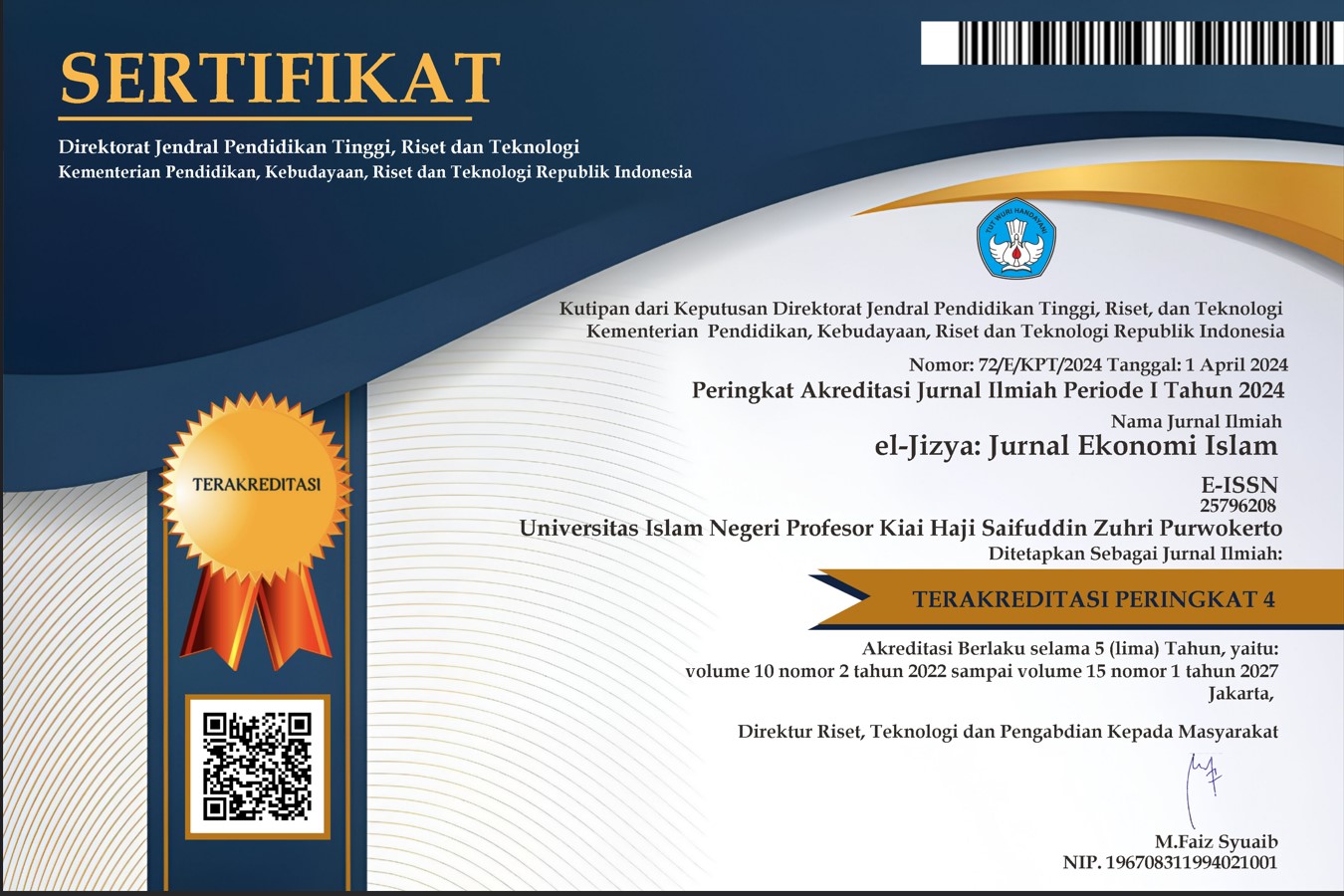TIME VALUE OF MONEY DALAM PERSPEKTIF EKONOMI ISLAM
Keywords:
Time Value of Money, Islamic EconomicsAbstract
Abstract The time value of money is associated with the current value and future value because the money received now is more worth than the money received in the future. However, is the concept of time value of money is appropriate and justified by the Shari'ah? The time value of money is a concept that says that the money of the one rupiah that can be received today is more worth than one rupiah which will be received in the future time. The concept of time value of money is needed by financial managers in making decision when will invest in an asset and determine the source of loan funds that will be chosen. Islam views money as a flow concept. Money must rotate in an economy and may not be idle for too long time. Moreover, it lets for years. Islam does not recognize the method of time value of money because this method adds value to money solely with increasing time and not effort. Islam actually knows the money value of time; that is the time has economic value as well as the money value of money. Imam Nawawi provides definition related to value addition for money based solely on the value of time is the category of riba.References
Achsien, Iggi H. 2003. Investasi Syariah di Pasar Modal: Menggagas Konsep dan Praktik Manajemen Portofolio Syariah. Jakarta: Gramedia Pustaka Utama.
Adnan, Muhammad Akhyar & Hanum, Nuroh Shobah. 2014. “Pemahaman dan Akseptansi para Bankir Bank Syariah dan Manajemen Lembaga Keuangan Syariah terhadap Pendekatan Economic Value of Time untuk Produk Murabahahâ€, Jurnal Ekonomi, Manajemen, dan Akutansi, Vol. 23, No. 2.
Anggadini, Sri Dewi. 2012. “Pengaruh Time Value of Money terhadap Kualitas Pelayanan Publikâ€, Jurnal Riset Akuntansi, Vol. 2, No. 1.
Anto, Hendri. 2003. Pengantar Ekonomika Mikro Islami. Yogyakarta: Ekonisia.
Antonio, Muhammad Syafi’i. 2011. Bank Syariah bagi Bankir dan Praktisi Keuangan. Jakarta: IIIT.
________________. 2001. Bank Syariah: Dari Teori ke Praktik. Jakarta: Gema Insani Press.
Arif, M. Nur Rianto al-. 2015. Pengantar Ekonomi Syariah. Bandung: Pustaka Setia
Case, Karl E. & Fair, Ray C. 2002. Principle of Economics. New Jersey: Prentice Hall.
Halim, Abdul. 2007. Manajemen Keuangan Bisnis. Bogor: Ghalia Indonesia.
Haming, Murdifin & Basalamah, Salim. 2010. Studi Kelayakan Investasi Proyek dan Bisnis. Jakarta: Bumi Aksara.
Karim, Adiwarman A. 2004. Bank Islam: Analisis Fiqh dan Keuangan. Jakarta: RajaGrafindo Persada.
_________________. 2014. Ekonomi Makro Islami. Jakarta:RajaGrafindo Persada.
Khan, M. Akram. 1992. “Capital Expenditure Analyisis in an Islamic Frameworkâ€, dalam Syeikh Ghazali, et al., An Introduction in Islamic Finance. Kuala Lumpur: Quill Publisher.
Khoir, Misbahul. 2016. “Nilai Waktu dari Uang dalam Perspektif Ekonomi Islamâ€, Jurnal Ekonomi Syariah (JES), Vol.1, No.1.
Muhammad. 2003. Manajemen Bank Syariah. Yogyakarta: UUP AMP YKPN.
__________. 2004. Dasar-Dasar Keuangan Islam. Yogyakarta: Ekonisia.
Najmudin. 2011. Manajemen Keuangan dan Akuntansi Syar’iyyah Modern. Yogyakarta: Andi Offset.
Tampubolon, Manahan P. 2005. Manajemen Keuangan. Bogor: Ghalia Indonesia.
Wiagustini, Ni Lu Putu. 2012. Dasar-Dasar Manajemen Keuangan. Bali: Udayana University Press.
Wibowo, Edi & Widodo, Untung Hendry. 2005. Mengapa Memilih Bank Syariah. Bogor: Ghalia Indonesia.
Zarqa, M. Anas al-. 1992. “An Islamic Perspective an Economics of Discounting in Project Evaluationâ€, dalam Syeikh Ghazali, et al., An Introduction in Islamic Finance. Kuala Lumpur: Quill Publisher.
Adnan, Muhammad Akhyar & Hanum, Nuroh Shobah. 2014. “Pemahaman dan Akseptansi para Bankir Bank Syariah dan Manajemen Lembaga Keuangan Syariah terhadap Pendekatan Economic Value of Time untuk Produk Murabahahâ€, Jurnal Ekonomi, Manajemen, dan Akutansi, Vol. 23, No. 2.
Anggadini, Sri Dewi. 2012. “Pengaruh Time Value of Money terhadap Kualitas Pelayanan Publikâ€, Jurnal Riset Akuntansi, Vol. 2, No. 1.
Anto, Hendri. 2003. Pengantar Ekonomika Mikro Islami. Yogyakarta: Ekonisia.
Antonio, Muhammad Syafi’i. 2011. Bank Syariah bagi Bankir dan Praktisi Keuangan. Jakarta: IIIT.
________________. 2001. Bank Syariah: Dari Teori ke Praktik. Jakarta: Gema Insani Press.
Arif, M. Nur Rianto al-. 2015. Pengantar Ekonomi Syariah. Bandung: Pustaka Setia
Case, Karl E. & Fair, Ray C. 2002. Principle of Economics. New Jersey: Prentice Hall.
Halim, Abdul. 2007. Manajemen Keuangan Bisnis. Bogor: Ghalia Indonesia.
Haming, Murdifin & Basalamah, Salim. 2010. Studi Kelayakan Investasi Proyek dan Bisnis. Jakarta: Bumi Aksara.
Karim, Adiwarman A. 2004. Bank Islam: Analisis Fiqh dan Keuangan. Jakarta: RajaGrafindo Persada.
_________________. 2014. Ekonomi Makro Islami. Jakarta:RajaGrafindo Persada.
Khan, M. Akram. 1992. “Capital Expenditure Analyisis in an Islamic Frameworkâ€, dalam Syeikh Ghazali, et al., An Introduction in Islamic Finance. Kuala Lumpur: Quill Publisher.
Khoir, Misbahul. 2016. “Nilai Waktu dari Uang dalam Perspektif Ekonomi Islamâ€, Jurnal Ekonomi Syariah (JES), Vol.1, No.1.
Muhammad. 2003. Manajemen Bank Syariah. Yogyakarta: UUP AMP YKPN.
__________. 2004. Dasar-Dasar Keuangan Islam. Yogyakarta: Ekonisia.
Najmudin. 2011. Manajemen Keuangan dan Akuntansi Syar’iyyah Modern. Yogyakarta: Andi Offset.
Tampubolon, Manahan P. 2005. Manajemen Keuangan. Bogor: Ghalia Indonesia.
Wiagustini, Ni Lu Putu. 2012. Dasar-Dasar Manajemen Keuangan. Bali: Udayana University Press.
Wibowo, Edi & Widodo, Untung Hendry. 2005. Mengapa Memilih Bank Syariah. Bogor: Ghalia Indonesia.
Zarqa, M. Anas al-. 1992. “An Islamic Perspective an Economics of Discounting in Project Evaluationâ€, dalam Syeikh Ghazali, et al., An Introduction in Islamic Finance. Kuala Lumpur: Quill Publisher.
Downloads
Published
29-12-2017
How to Cite
Yuliono, Y. (2017). TIME VALUE OF MONEY DALAM PERSPEKTIF EKONOMI ISLAM. El-Jizya : Jurnal Ekonomi Islam, 5(2), 177–192. Retrieved from https://ejournal.uinsaizu.ac.id/index.php/eljizya/article/view/2690
Issue
Section
Articles
License
Authors who publish with this journal agree to the following terms:
- Authors retain copyright and grant the journal right of first publication with the work simultaneously licensed under a Creative Commons Attribution-ShareAlike License that allows others to share the work with an acknowledgement of the work's authorship and initial publication in this journal.
- Authors are able to enter into separate, additional contractual arrangements for the non-exclusive distribution of the journal's published version of the work (e.g., post it to an institutional repository or publish it in a book), with an acknowledgement of its initial publication in this journal.
- Authors are permitted and encouraged to post their work online (e.g., in institutional repositories or on their website) prior to and during the submission process, as it can lead to productive exchanges, as well as earlier and greater citation of published work (See The Effect of Open Access).















